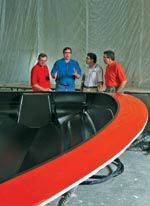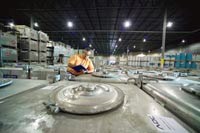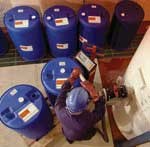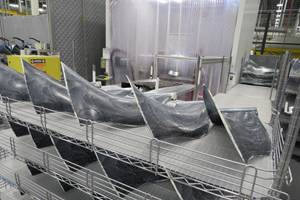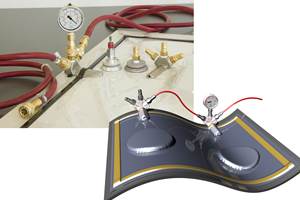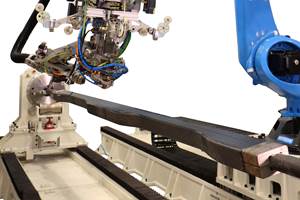Distributors in the composites industry
More than "middlemen," they play a key role in successful projects for many fabricators.
Share
Read Next
Why would anyone buy from a distributor? Alan Gardiner, VP of sales and marketing for distributor Min-Chem Canada Inc. (Oakville, Ontario, Canada), overheard that comment uttered by a seatmate on a plane flight one evening. "I saw my opportunity and introduced myself as a distributor, and talked about the positive role we play," he recalls. "Distributors aren't a cost addition, they actually can save money for both the supplier and the customer."
Sometimes considered unnecessary middlemen that add cost to material purchases, distributors are, in fact, a vital link in the composites industry, bringing tangible benefits to both material manufacturers and the end-users as well. Composites industry veteran Ben Rasmussen, president of market research firm BMR Assoc. (Plainfield, N.J.) says distributors fill a void that most suppliers simply can't, because of the sheer numbers of customers and their geographic diversity.
"As an example, distributors have really helped many customers with the changeover from open molding to closed molding, with their technical know-how," says Rasmussen. "Distributors are riding a wave of business growth and maturation that should continue for several years to come," he adds. In the U.S. alone, the total wholesale-distribution industry has sales in the trillions of dollars — $2.9 trillion (USD) in 2003 — and employs one of every 20 U.S. workers, according to one published source.
In this article, CT looks behind the curtain to reveal how distribution works for the majority of markets and hears from a number of large and small distribution companies around the world about the types of services they offer and the value they add to the global industry.
Global supply, local customers
In industries such as composites, where many of the materials are made continuously or in large batches, shipments also must be large, in the form of truckloads or railcar loads, to make economic sense. From a practical standpoint, it's not feasible for a single supplier to fulfill many thousands of small orders to customers around the world. Therefore, the distributor's primary function is to buy large quantities of a material from a manufacturer or supplier, create smaller material units, sell those smaller units to many customers, and ensure timely delivery. They are distinct from brokers or agents, who neither take delivery of nor title to the material, and surplus buyers, who typically buy aged material or overage and resell it at a discount. Most distributors sell resins, reinforcements, catalyst and other products in large quantities to commodity end-users — including tub/shower, pool and spa, solid surface and sanitary ware, industrial, piping, corrosion, marine, automotive/transportation and sporting goods. Aerospace is typically a small market for most distributors, since aerospace customers tend to buy specific, prequalified materials direct from suppliers, even in small quantities.
Certainly, some very large customers with means can bypass distribution and buy truckload quantities directly from a supplier, but most medium to small businesses have neither the cash flow to afford an entire truckload nor the storage space to hold it. A distributor can offer customized quantities to suit any application for smaller or new customers, which allows the supplier to cost-effectively reach more users. In effect, the distributor provides inventory control for users, through regular communication among the customers, sales reps and the distributor's buyers.
To handle their own inventories, distributors run the gamut of methods: some depend almost entirely on good communication to forecast needs, while others employ sophisticated computer forecasting and management software tools. "Inventory management is an art," says Gardiner. "Computers can provide assistance, but it's a constant balancing act."
Jud Smith, VP of source management for Ashland Distribution (Columbus, Ohio) says that his company will sell any quantity with the hope and expectation that the customer will eventually increase its size and orders. "Some of our best customers started by buying pails of product," he points out. "But small purchases are increasingly becoming the exception as consolidation continues and customers take advantage of better pricing with larger purchases."
North American distributors have consolidated significantly over the past 15 years. The three largest — Composites One (Arlington Heights, Ill.), Ashland Distribution (Columbus, Ohio) and North American Composites (NAC, Lino Lakes, Minn.) — represent 80 percent of the North American composite distribution marketplace, through organic growth and acquisitions, says Composites One president and COO Leon Garoufalis. "More than 40 independent distribution companies have been acquired over the past 20 years," he notes. "From a sales numbers standpoint, we're the same size or larger than some of our suppliers." The top three are followed by strong regional and specialty distributors, such as Superior Fiberglass and Resins (Indianapolis, Ind.); western U.S. distributor Revchem Plastics Inc. (Bloomington, Calif.); Advanced Plastics Inc. (Nashville, Tenn.), which covers the southern U.S.; Mahogany Co. of Mays Landing Inc. (Mays Landing, N.J.), which specializes in marine products for the Northeast U.S.; and many more.
As the consolidation trend has continued, the remaining U.S. and Canadian distributors have acquired greater numbers of product lines, leading to a vertically integrated "one-stop-shopping" philosophy, with extensive "line cards" of products from multiple sources for every type of application. At the same time, several resin manufacturers have made equity investments in distribution firms, both in North America and other regions — for example, Cook Composites & Polymers (CCP, Kansas City, Mo.) in Composites One, Ashland Specialty Chemical - Composite Polymers (Columbus, Ohio) in Ashland Distribution and Interplastic Corp. (St. Paul, Minn.) in North American Composites. Despite those business relationships, the one-stop shopping approach means most North American distributors sell resins and gel coats not only from their partner company but from other suppliers as well. The practice helps to insulate the distributors from any supply shortages, because there's always a second (or third) commodity material choice, says Interplastic's president Gary Steinman.
With diverse competing products sitting in the distributor's warehouse, suppliers are obliged to ensure that the distributor's sales force is armed with timely product information and trained to sell their products effectively. The result is a positive double whammy for customers, who get the benefit of wide selection as well as the distributor's technical knowledge and know-how about materials and manufacturing technologies.
In contrast, distribution in Europe is much different. With more countries in a smaller area, involving shorter distances and generally smaller customers, distribution tends to be very regional, says one material supplier. End-users generally have strong product preferences, and given cross-border shipping issues, typically buy from a local distributor within their own country. Distributors also may have ties to or have established partnerships with suppliers of other types of products. While resin giant DSM Resins (Schaffhausen, Switzerland) operates its distribution arm Euroresins Group throughout Europe, Saint-Gobain Vetrotex International (Chambery, France) is its own European distributor, says Mark Caron, sales and product development manager for Saint-Gobain Technical Fabrics (Brunswick, Maine), and distributes not only glass reinforcements but resins, core materials and consumables as well. DIAB Group (Laholm, Sweden), a core manufacturer, is also a distributor for all types of composite materials in Sweden and Finland.
Other important regional European distributors include ICOM Composites (Kolding, Denmark); French epoxy resin supplier Sicomin (Chateauneuf-les-Martigues, France), which also distributes a range of materials for fabricators; Cial Fontanals (Barcelona, Spain); and Polychem (Vrbno pod Pradedem, Czech Republic). In other regions of the world, Australia tends to follow the North American distribution model, being a single country with huge shipping distances, while China and the Pacific Rim tend toward the European style of smaller regional distributors.
Distributors perform important functions for customers. A key service is financing and credit. "The distributor takes the risks associated with buying the material," says Min-Chem's Gardiner. Distributors purchase and take title to large quantities of materials from suppliers, then typically extend credit terms to their customers. This represents a huge benefit for many fabricators, large and small, especially during down business cycles. The distributor also takes on quality management as well, ensuring that customers receive defect-free materials. "The distributor has a relationship with both the supplier and the customer, so he can assist the customer and manage a situation involving quality," Gardiner explains. "The distributor has some leverage to help resolve the issue with the supplier, because the supplier doesn't want to risk losing customers if it isn't worked out."
Distributors also facilitate timely delivery. Many in North America have dedicated truck fleets or close relationships with common freight carriers. Materials are stored in centrally located warehouses (owned, leased or rented) that are in close proximity to customers. Most offer services like slitting, kitting, cutting and gel coat color matching to facilitate the customer's processes.
A key function provided by distributors is market intelligence. Customers benefit because the distributor informs them of price trends or shortages, to help keep their businesses competitive. Suppliers get the benefit of the distributors' knowledge of thousands of customers, which helps them predict demand for products and new product development.
At the end of the day, no matter how large or small the distributor's company, its inventory and product lines, or the size and number of customers it serves, the business is local, says Garoufalis. "You're building relationships with customers on a local level, and you must provide technical support and customer service locally to serve them."
Serving North America
Min-Chem started as an exclusive distributor for catalyst products from Akzo Nobel Polymer Chemicals LLC (Chicago, Ill.) more than 25 years ago. It is one of several successful Canadian composite distributors, along with Composites Canada and Progress Plastics and Compounds Co., both based in Mississauga, Ontario, Canada. Gardiner says the company eventually opted to start carrying more products for composite fabricators because the catalyst represented such a small volume of the total material purchase. The company's philosophy is to bring solutions to its customers, mainly in tub/shower, solid surface and transportation, based on the sales force's accumulated years of experience in fabrication and materials. "They see so much, and go to so many shops, that they build up a 'war chest' of experience and can do a lot of troubleshooting for the customer," says Gardiner.
With three warehouses in Canada, Min-Chem uses public transport to ship goods, rather than maintaining a fleet of delivery trucks. Advantages of this approach include same-day shipping, as opposed to scheduled weekly runs, and lower overhead. Inventory control is accomplished through good communication between the sales staff and customers and feedback to buyers who constantly update material orders, rather than a specific software program.
Gardiner notes that resins and catalysts are getting harder to ship because of Canada's regulations governing flammable materials. Catalysts in particular have to be refrigerated, but refrigerated trucks that haul food products can't be used — only "designated" trucks are allowed. "That's a challenge, but the distributor has to stay on top of it and find ways to cost-effectively manage it for his customers," he adds.
Distribution giant Composites One is North American's largest. It owns or leases 32 warehouses in the U.S. and British Columbia, Canada, and also operates from several public warehouses, says Garoufalis. Formed in 1999, it traces its history back to Great Lakes Terminal & Transport Corp., later Great Lakes Solvents, a Chicago-area chemical distributor that began operation in 1940 under the leadership of Louis Dehmlow, the father of Composites One's current CEO. Dehmlow, at one time the chairman of the National Association of Wholesaler-Distributors (NAW), wrote extensively about distributors and the positive role they play. "Louis Dehmlow really defined the basic functions of distributors and recognized that we are partners in the production process," says Garoufalis.
Composites One's largest market is marine, followed by transportation (trucks, buses), recreational vehicles, industrial/corrosion, tub/shower, cast polymer and a small number of aerospace customers. Processes covered include open and closed molding, sheet molding compound (SMC), bulk molding compound (BMC) and pultrusion. With more than 8,000 customers, inventory control is managed with computer software support, combined with thorough knowledge of those customers' production rates. "We source based on history and forecasting what our customers are buying on a regular basis," Garoufalis explains. "We communicate with them based on our forecasts to ensure we have the right material when they need material." A large fleet of company-owned or leased trucks transports the materials to customers.
The company operates a business-to-business Web site where customers can place orders, check order status, review order history and credit, download material safety data sheets (MSDSs) and more, which helps them manage their businesses better, claims Garoufalis. A cutting and kitting operation is located in Lakeland, Fla., where reinforcements are precut to customer specification for more efficient production. Composites One has taken a very active role in helping its customers make the conversion from open to closed molding. It provides general information, technical assistance and training sessions, and as well as access to industry experts, including Doug Smith of RTM North (Ontario, Canada). Another value-added service is regulatory compliance assistance.
Ashland Distribution maintains 70 warehouses across North America. These facilities service not only the composites industry but Ashland's thermoplastics and chemicals businesses as well. From its inception 17 years ago, Ashland has grown both organically and through acquisition — 13 separate companies were combined to form the current business unit, says Smith. The company maintains its own fleet of about 400 delivery trucks.
For its distribution inventory control, Ashland employs an enterprise resource planning program from software giant SAP (Frankfurt, Germany). According to Don Belock, director of composites source management for Ashland Distribution, the software provides a very powerful tool to manage enormous inventories, by factoring in historical usage, commitments to customers, typical supplier lead times and existing stockpiles. "The software provides us a clear picture of what is moving slower than we planned, and we typically can easily find other companies who can use the products."
To help guide a customer through a wide range of materials from myriad suppliers, Smith says that sales reps classify materials into ranges, from "premium" to "moderate" to "lower-shelf" economy pricing. "We can walk a customer through the differences to help them make the right choice," says Smith. He points out that with a tight market in which some materials, like woven carbon fiber fabrics, are hard to obtain, materials might have to be pulled from several supplier sources.
For resins with a finite shelf life, Ashland (as well as the other companies interviewed) employs a "first in, first out" procedure, that is, ensuring that resin products are delivered to customers in a timely fashion, within specified time limits. "When we bring resin into the warehouse, we log it in and receive it under a specific receiving number," says Belock. "So when we are ready to deliver the product, the warehouse person knows exactly what drum to pull."
Ashland's major markets include marine, tub/shower and spa, corrosion (piping and tanks), transportation, cultured marble and sporting goods. Aerospace comprises about 10 percent of the company's customer base.
North American Composites maintains 23 warehouses, including four in Canada. NAC has significant presence in all of the business segments making up the composites industry. As with the other distribution companies discussed, NAC has grown by acquisition and has extensive product lines, says NAC spokesman Gary Steinman. "A distributor wants to be able to provide the widest possible product selection — if he doesn't have it, companies are very entrepreneurial and can readily find it." Adding to NAC's already extensive product offering, the company recently announced it will distribute Saint-Gobain Vetrotex America Inc. (Valley Forge, Pa.) reinforcements and Saint-Gobain Technical Fabrics. Steinman adds that NAC's strength is providing local customer service coupled with national coverage.
In addition to the basics of resins, gel coats, reinforcements and catalysts, NAC sells and finances equipment, including storage facilities, and provides environmental services including waste reclamation. Other value-added services include slitting of reinforcements and customized gel coat color matching using tinting systems from multiple gel coat suppliers.
Adding value globally
Distributor Huntsman Composites is a division of resin producer Huntsman Chemical Company Australia Pty. Ltd. (West Footscray, Victoria, Australia), Australia's only manufacturer of styrene monomer. Huntsman Chemical also holds manufacturing license agreements with Ashland and Scott Bader Co. Ltd. (Wellingborough, Northamptonshire, U.K.). Huntsman Composites serves customers in Australia, Southeast Asia, New Guinea, New Zealand and Fiji. "Sales forecasting is critical for all our imported products," says new products manager Barry Hutchison, noting that a 12-week lead-time is not unheard of for reinforcements imported from China, the U.S., India, Taiwan and Europe. He adds that storage and shipment of methyl ethyl ketone peroxide (MEKP) catalysts in large volumes is becoming more difficult because of ever-more-stringent environmental regulations in Australia, as elsewhere. Licensed storage facilities are required, where space is at a premium.
The company deals primarily in polyester resins, which Huntsman produces locally, along with competitors Valspar (Carleton, South Victoria, Australia) and Nuplex (Botany, New South Wales, Australia — a DSM company). Principal markets are corrosion, transportation, pool/spa, marine, tub/shower, casting and industrial. "Because the market size is very small compared to North America and Europe, all suppliers tend to compete in all markets," notes Hutchison.
With six warehouses around Australia, one in each major city and one in far north Queensland, Huntsman Composites ships via a separate dedicated common carrier in each region. According to Hutchison, it costs more to send materials from Melbourne to Brisbane than to import the materials from the U.S., because of the distances involved. He believes that China will be a major material supplier in the future, at least for glass reinforcements. "The quality from the major manufacturers like CTG Intl. [Shandong, China] and CPIC/Fiberglass [Chongquing, China] is excellent, and they are dramatically increasing their capacity in 2005."
Through Huntsman Chemical, a resin technology group can assist customers with resins, as well as gel coats, color matching and other technical issues. Training sessions are available for customers for all composite products and related safety issues.
ICOM Composites offers a very comprehensive range of products from numerous suppliers, because of the firm's diverse customer base. Line cards include rovings from Johns Manville (Denver, Colo.), technical fabrics from Saint-Gobain, internal and external mold release from Axel Plastics Research Labs Inc. (Woodside, N.Y.), peroxides from Pergan GmbH (Bocholt, Germany) and many others from U.S., European and Chinese suppliers, says company president Peder Irgens. Customers are located primarily in Denmark, Norway and Sweden, as well as Belgium and Germany, and are involved in the manufacture of wind blades, pipes, tanks, other industrial products, polymer concrete, sanitary ware and boats.
Irgens says that European distributors have emerged from a tough economic period over the last year or two, because of intense cost pressures. Even the cost of shipping to neighboring Scandinavian countries has forced some of his customers to a lower price point product, according to Irgens. The company is close to opening a new warehouse in Norway because of issues associated with shipping resins and catalysts, considered "dangerous goods," by ferry from Denmark — it's much more cost-effective to transfer truckload shipments to stock the warehouse than pay the high fees for each individual customer order.
An interesting twist on shipping for ICOM's in-country customers is Denmark's "freight central" concept, in which common freight carriers pool their resources under common dispatch arrangements and shared loads. According to Irgens, an order received by 3:00 p.m. can be shipped and at the customer's door the next day, under this efficient setup. Another advantage is leased warehouse space that he terms a "warehouse hotel," which is more economical than full ownership since staffing isn't required. "It's a constant economic calculation to maintain inventories yet achieve quick turnover with speed of service," says Irgens.
Brazil's Barracuda Technologies (Rio de Janeiro, Brazil) is an advanced materials supplier to the marine, wind energy, transportation and aerospace sectors. The company follows a more aerospace-oriented distribution philosophy, with exclusive supply arrangements with a few large suppliers, including DIAB Group for foam cores, Saint-Gobain Technical Fabrics and Plascore Inc. (Zeeland, Mich.) for honeycomb, says company head Jorge Nasseh, a naval and composites engineer.
"We're more interested in a technical approach," says Nasseh. "We have engineers on staff that ensure that the customers are getting 100 percent of the materials' performance in their designs."
With two warehouses, Barracuda distributes throughout Brazil and some neighboring countries, often using sales agents. Import of materials into the country is a real challenge, says Nasseh, due to rigid customs rules, handling charges and import taxes. "A shipping mistake can make the difference between a profit and a loss — keeping material in the pipeline is a 24/7 job," he states. Barracuda uses its own truck fleet for delivery within a roughly 100 miles radius from its warehouses, and uses container transit for longer trips.
"The best distributors blur the lines between the supplier and the distributor, giving the customer seamless service," says one distributor with operations in several countries. Given the diversity of the composites manufacturing industry, distributors will continue to play a key role in customer success — far into the future.
Related Content
Plant tour: Albany Engineered Composites, Rochester, N.H., U.S.
Efficient, high-quality, well-controlled composites manufacturing at volume is the mantra for this 3D weaving specialist.
Read MoreSmartValves offer improvements over traditional vacuum bag ports
Developed to resolve tilting and close-off issues, SmartValves eliminate cutting through vacuum bags while offering reduced process time and maintenance.
Read MoreMFFD thermoplastic floor beams — OOA consolidation for next-gen TPC aerostructures
GKN Fokker and Mikrosam develop AFP for the Multifunctional Fuselage Demonstrator’s floor beams and OOA consolidation of 6-meter spars for TPC rudders, elevators and tails.
Read MoreCompPair adds swift prepreg line to HealTech Standard product family
The HealTech Standard product family from CompPair has been expanded with the addition of CS02, a swift prepreg line.
Read MoreRead Next
Developing bonded composite repair for ships, offshore units
Bureau Veritas and industry partners issue guidelines and pave the way for certification via StrengthBond Offshore project.
Read MorePlant tour: Daher Shap’in TechCenter and composites production plant, Saint-Aignan-de-Grandlieu, France
Co-located R&D and production advance OOA thermosets, thermoplastics, welding, recycling and digital technologies for faster processing and certification of lighter, more sustainable composites.
Read MoreAll-recycled, needle-punched nonwoven CFRP slashes carbon footprint of Formula 2 seat
Dallara and Tenowo collaborate to produce a race-ready Formula 2 seat using recycled carbon fiber, reducing CO2 emissions by 97.5% compared to virgin materials.
Read More




